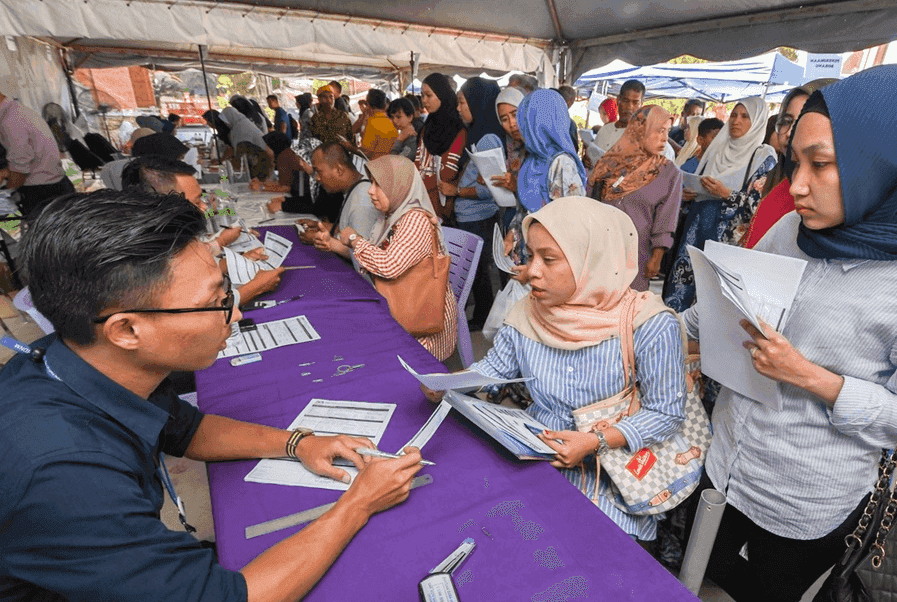Cash aid no fix for poverty, says economist
Government handouts have been a norm ever since the administration of Najib Razak, who first introduced the cash aid programme known as BR1M.
Just In
An economist says that giving cash handouts to those in the lower-income bracket will not help tackle the larger problem of poverty in the country, as the practice which began under the administration of Najib Razak appears set to continue under current prime minister Anwar Ibrahim.
Najib, who like Anwar, held the posts of both prime minister and finance minister, introduced the payments then known as Bantuan Rakyat Malaysia or BR1M in his budget for 2012.
While it was welcomed by those in the B40 or Bottom 40 group, the practice was criticised by other politicians including Dr Mahathir Mohamad and Anwar himself, who was the opposition leader at the time.
But despite the brickbats, the giving of handouts continued long after the collapse of Najib's Barisan Nasional government six years later.
Mahathir's Pakatan Harapan administration, which ruled for the next 22 months, rebranded the payments as Bantuan Sara Hidup (BSH).
Under Muhyiddin Yassin's government, which came next, the handouts were renamed Bantuan Prihatin Nasional.
The payments were rebranded yet again under the government of Ismail Sabri Yaakob, when they became known as Bantuan Keluarga Malaysia.
Under Anwar's administration, they were renamed Sumbangan Tunai Rahmah (STR).
Phase One of the STR payments began on Jan 17. In all, a total of RM1.67 billion is expected to be spent on the handouts.
Speaking to MalaysiaNow, however, economist Lee Heng Guie said such payments were only enough to provide their recipients with short-term relief.
Lee, the executive director of the Socio-Economic Research Centre, said while the government was still responsible for the welfare of the B40, its main goal should be to ensure that those in this income bracket do not remain there forever.
He said this meant that the government would need to prioritise efforts to ensure sustainable economic growth, and continue to create job opportunities in addition to finding ways to lower the cost of goods.
"It would be better to help them find jobs or ways to earn an income by improving their skill sets," he said.
"It doesn't make sense to encourage this kind of aid every year."
As for now, Lee said, such aid was still necessary, especially as the people struggle to regain their footing after the Covid-19 pandemic.
But he said that many, economists included, had reservations about the aid scheme given the country's fiscal position and the fact that the national debt and liabilities had hit RM1 trillion.
Cash aid aside, he said, there were also other forms of assistance such as subsidies that needed to be covered through funds allocated in the annual budget.
"This is why it's important to ensure that only those who truly need it receive this aid," he said.
"The question is, how is the government going to do that? That is where the real challenge lies."
Throughout the years, concerns have been raised about how the government's cash aid is spent, with reports of recipients using it on even non-essential items such as cigarettes.
In 2017, meanwhile, a recipient who was unemployed at the time claimed to have bought drugs with his BR1M money, further fueling debate about the abuse of the aid scheme.
Even the voucher booklets given under Najib's administration were embroiled in controversy due to reports of recipients selling them at a discount simply to obtain some cash in hand.
Lee said this was why the government needed to ensure that the distribution of aid was done based on accurate data evaluation.
He also advised the setting of clear criteria for recipients.
Jeniri Amir, a senior fellow at the National Professors Council, said that politically, such aid could be seen as a populist measure to win the hearts of the people.
He said giving cash handouts allowed leaders to boost their reputation and image, as well as that of the ruling government.
"Politicians know that this is the best way to win the people over," he said.
"And for the opposition, it is political ammunition to tarnish the government's image," he added, referring to Mahathir's stand on BR1M before it was rebranded as BSH.
"But the people love it. Who doesn't like money?" he said.
"This is the easy way to help the people, even though in reality, it is not the best way."
Subscribe to our newsletter
To be updated with all the latest news and analyses daily.
